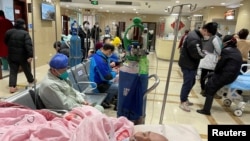Liu Shihui, a human rights lawyer in California who grew up in Xishan Village in Inner Mongolia, learned of the dire situation in neighboring villages from his family when he called on January 23 with Lunar New Year greetings.
“In previous winters, it was normal if one or two or three or five people died," he told VOA Mandarin. "This wave of epidemics killed more than 20 people in about a month in the neighboring village. It is quite alarming.”
Jie Lijian, a human rights activist who also lives in California where he works in shipping, told VOA Mandarin that there are about 1,000 people in his hometown, Gaozhaizi, a rural village in Shandong province, and that at least 20 elderly people have died of COVID since Beijing relaxed the “zero-COVID” policy.
After everyone in Jie’s extended family became infected, a man believed to be about 60 years old died in early January.
“He was sent to the hospital at the end of [December] and died in less than a week after he came back home," Jie told VOA Mandarin.
The county hospital, critically short of beds and doctors, had turned him away.
In the past, people in Jie’s village bought special Lunar New Year gifts and treats in the days before the family-focused holiday. This year, he said, “How could there be any New Year atmosphere? People felt depressed and miserable.”
Chinese health officials said the country's current wave of COVID-19 infections is "coming to an end,” citing only 6,364 COVID-related deaths in hospitals in China from January 20 to 26.
The Chinese CDC said in a January 25 report that there had been "no obvious rebound" during Lunar New Year holidays, which began January 22 when millions of people nationwide reunited with family they had not seen during the travel restrictions.
Wang Ming, a resident of Sixiatou who asked VOA Mandarin to use a pseudonym so he could avoid attracting the attention of state security, said that three elderly people died in his village of more than 700 people in Henan Province, and more than 20 people died in a nearby village to the east.
"I attended four funerals of relatives and friends, all of those who died were over the age of 65,” Wang said. In an administrative area with as many as 2,000 residents, he said there was one doctor.
Not enough supplies rural areas
Huang Yanzhong, senior fellow for global health at the Council on Foreign Relations and a professor at Seton Hall University School of Diplomacy and International Relations, wrote in an opinion piece for CNN that China’s rural areas have only 4.95 hospital beds and 5.18 health professionals per 1,000 people.
President Xi Jinping’s signature zero-COVID policy widened the gap in the rural health system. During the three years of the policy’s lockdowns, the government controlled distribution of antipyretics, cough medicines, antibiotics and antiviral drugs, a move that Huang wrote had left rural hospitals and clinics undersupplied.
A doctor at the Xide County People's Hospital in Sichuan province told VOA Mandarin that COVID patients occupied all of the surgical beds in the hospital where 90% of medical staff had COVID.
“The rural hospitals still had cold and fever medicines they stocked in the past,” he said. “After this wave of infection, they basically used them up. There’s no solution if there isn’t enough medicine. … Since the reopening, everyone is rushing for and hoarding medicines. There’s no solution if they can’t buy them. These medicines must be purchased in a centralized way.”
In rural Shandong, Jie said that pharmacies don’t even have licorice tablets, cough syrup, ibuprofen, Tylenol, penicillin, or cold remedy granules, a traditional blend of Chinese herbs used to treat headache, fever, runny nose, hay fever, allergies and sore throat.
"Some veterinary clinics have veterinary fever medicines for cows, pigs and donkeys, and some people are buying them," he said.
Farmers seeking medical treatment for family members or cremations for those who died face high costs, according to Jie.
The New Rural Cooperative Medical Scheme, which covers many farmers, does not offer reimbursement for cold and fever medicines, according to Jie. The government launched the initiative in 2003 in response to the poor state and high costs of health care in rural China.
Jie said the villagers must pay an extra $5,900 to $7,400 to expedite cremation when a family member dies unless they are prepared to wait a week for a $700 to $900 cremation. Some families prefer burials, which means bribing a local official to allow the banned option and then paying gravediggers.
'No one cares'
In an online call to grassroots cadres and citizens to wish them a happy Lunar New Year on January 18, Xi called on the county and village levels to take responsibility for COVID prevention and control.
The Ministry of Agriculture and Rural Affairs said on January 19 that a total of 19.01 million people were mobilized across the country to provide care for rural residents.
One of those residents, an elderly woman named Du Jinlian who just recovered from COVID, told VOA Mandarin that six elderly people died last month in Wentong, a village in Shaanxi Province.
“No one cares, and the village party secretary also knows that the condition is serious, but no one cares." Du said.
Wang said that during the three years of the zero-COVID policy, village cadres had locked down villages, blocked intersections, mandated quarantine and nucleic acid testing. They used loudspeakers to promote epidemic prevention policies 24 hours a day, but since the reopening, the government’s presence has almost disappeared.
"Suddenly there are no village cadres, no government agencies. … no loudspeaker," said Wang. "No one from the government talks about the epidemic and the virus."
Liu, who lived in rural Inner Mongolia for 35 years, said the government is ignoring the provincial farmers.
“They can’t take care of Beijing and Shanghai," said Liu, "and the countryside is simply out of their consideration."





